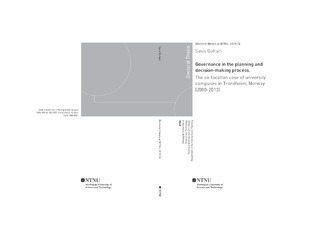Governance in the planning and decision-making process: The co-location case of university campuses in Trondheim, Norway (2000-2013)
Doctoral thesis
Permanent lenke
http://hdl.handle.net/11250/2594244Utgivelsesdato
2019Metadata
Vis full innførselSamlinger
Sammendrag
The co-location of NTNU campuses in Trondheim has involved many different and contrasting political interests and power relations that has undermined the process of decision-making and planning for more than 20 years. The essence of this thesis was distilled from the general assumption that network governance, which is based on the negotiation and collaboration rationality, can overcome the limitations of anarchic market exchange and top-down planning and decision-making.
The main research question was ‘how the governance structure and process have influenced campus development in Trondheim from 2000 to 2013’. The thesis tried to empirically address the complex, non-linear and multi-layered processes of NTNU’s co-location case, using and integrating different theoretical-analytical models, including ‘structural-functionalism’ and ‘rounds model of decision-making’ to explain and illuminate why the co-location was stopped in 2006 and thereafter approved in 2013. This thesis represents an embedded single case study, which looked at three levels of governance: understructure and superstructure, referring to ‘university governance’, and middle structure or ‘urban governance’. Accordingly, the research objective was to analyze ‘governance structures’, i.e. the way actors stand in a network and interact with each other across levels, together with ‘governance processes’, i.e. the interrelation between actors’ attributes (such as interests, resource, power and roles) at different levels and rounds of decision-making.
Interviews, archival records and documentation were the main research methods and he units of analysis were the individual and collective actors’ discourses and artefacts.
According to the findings, different factors challenged the efficiency of the governance network in this case:
- The dynamic changes in the composition of the actors
- The informal/ interpersonal actors’ networks and their direct interference
- The secret collusive relationship between politicians
- The presence of unresolved tensions/conflicts
- Ineffective leadership
- Lack of accountability and control functions
- Frustration over the lack of clear and visible results
- Uncertainty about access to the critical resources
- Lack of transparency of interests and strategies, and
- Distortion and change of the set agenda or the policy process.
Nevertheless, engineering an optimal/effective governance was a challenging task, and factors related to the culture of the institution and government priorities had a considerable influence on the outcome of the planning and decision-making processes. Based on the results, a moderate hierarchy was needed to reach a decision, and to overcome the anarchy of network governance, which can be time-consuming and resource intensive.
The thesis concluded that in order to understand complex, unpredictable and non-linear planning and decision-making processes, one should go beyond legal and formal frameworks, investigating the political structure underpinning the informal functioning of governance in terms of different actors’ roles, interests, resources and power. Thus, exploring governance requires political, cultural and periodic review. A longitudinal perspective can help to unfold the chain of events and processes, which can provide a better understanding about the reality of the case. It is important to understand the processes of change, including how and why they happened and whether the change was in response to an external crisis, e.g. uncertainty in government funding or change of national mood, or an internal crisis, e.g. lack of confidence in leadership or organizational resistance. In order to evaluate the effectiveness of a governance model, the thesis recommended identifying governance structure, operational efficiencies and ways of remedying its deficiencies in interaction with governance functions and processes. This will allow the non-political actors, including planners, to unravel the political planning and decision-making processes and to grasp their rationale. It provides a better understanding about the national political mood/priorities, organizational change, internal cultural diversity, potential contradictory interests, strategic roles, and interactions between formal and informal networks in the way they shape change or develop processes. In this regard, this thesis had abstractly contributed to the conceptualization and generalization of the accumulated political knowledge, which can help academics, planners and politicians to see some of what can be learned from practice and the realities of politics.
